英语语法名词性从句精讲1
高考英语语法名词性从句讲义和练习含答案

十一名词性从句语法精讲一.主语从句主语从句是在复合句中充当主语的从句,通常放在主句谓语动词之前或由形式主语it代替,而本身放在句子末尾。
It doesn’t interest me whether you succeed or not.It is in the morning that the murder took place.It is John that broke the window.1. 用it 作形式主语的结构(1) It is +名词+从句It is a fact that the earth is round.It is an honor that many specialists came to our English class.It is common knowledge that you say “ hello ”to your teacher when you first meet her at school.It is a rule that we should come to class before 8 c’clock.(2) it is +形容词+从句It is natural that he can’t speak excellent Chinese, as he is an Australian.It is strange that she came to school late this morning.(3) it is +不及物动词+从句It seems that it is going to rain.It happened that I met an old friend of mine in the street yesterday.(4) it +过去分词+从句( It is reported/said/proved/believed/known/expected/thought…)It is reported that China is going to launch “ Sheng Zhou” Six this year.It has been proved that you are wrong.It is said that that was how Chinese first raised silkworms.2. 主语从句不可位于句首的五种情况(1) if 引导的主语从句不可居于复合句句首。
英语语法精析精讲之名词性从句

英语语法总结全集名词和主谓一致一、名词的分类英语中名词主要可以分为可数名词和不可数名词。
1.可数名词可数名词一般都有单复数。
单数时,名词前可加不定冠词a/an;复数时,前面可加数词,名词本身要改成复数形式。
可数名词的复数有规则和不规则两种变化。
规则的名词,只要在单数名词之后加“s”,“es”或去“y”加“ies”就行,如:an umbrella, twelve umbrellas;a factory, three factories。
不规则的名词变化则要靠积累记忆,如:a mouse, ten mice;a policeman, six policemen。
有少数可数名词,如sheep,works(工厂),Chinese等,它们的单复数同形:a sheep, four sheep;a chemical works, five chemical works。
此外,还有一些可数名词只有复数形式,如clothes,trousers,cattle,police,people(人,人民)等。
英语名词中还有一些合成词,它们的复数形式有三种可能:1)后面的部分变成复数形式:grown-ups,boy students,grandchildren。
2)前面的部分变成复数形式:passers-by,lookers-on,sons-in-law。
3)前、后都变成复数形式:men doctors,women drivers。
2.不可数名词不可数名词没有单复数的变化,前面也不能加a/an,或数词。
但是我们可以用量词来表示不可数名词的数量,单复数表现在量词上,如:a piece of paper;two pieces of paper。
在有些情况下,不可数名词也可用a/an,表“一种”、“某种”的意思,如have a wonderful time,receive a good education,be made into a fine paper。
英语中的名词性从句

英语中的名词性从句名词性从句是英语语法中的一个重要部分,它在句子中充当名词的角色。
在英语中,名词性从句可以作为主语、宾语、表语或同位语,起到连接句子的作用。
本文将探讨名词性从句的不同类型以及其在句子中的应用。
一、名词性从句的类型名词性从句分为主语从句、宾语从句、表语从句和同位语从句。
这些从句的不同类型决定了它们在句子中的不同作用。
1. 主语从句主语从句作为句子的主语,引导整个句子的核心内容。
例如:"What she said is true."(她说的是真的。
)在这个例子中,主语从句"What she said"作为整个句子的主语,起到引导句子核心内容的作用。
2. 宾语从句宾语从句作为句子的宾语,接受动词的作用。
例如:"I don't know where she went."(我不知道她去哪儿了。
)在这个例子中,宾语从句"where she went"作为不及物动词"know"的宾语,接受动词的作用。
3. 表语从句表语从句作为句子的表语,用来描述主语或宾语的性质或状态。
例如:"The important thing is that you try your best."(重要的是你要尽力而为。
)在这个例子中,表语从句"that you try your best"用来描述主语"the important thing"的性质。
4. 同位语从句同位语从句用来解释或说明名词的含义。
例如:"His belief that hard work pays off is inspiring."(他坚信努力工作会有回报,这令人鼓舞。
)在这个例子中,同位语从句"that hard work pays off"用来解释名词"belief"的含义。
译林版八年级上册英语语法精讲

译林版八年级上册英语语法精讲一、名词性从句名词性从句是指在句子中充当名词的从句。
常见的名词性从句有三种:主语从句、宾语从句和表语从句。
1. 主语从句主语从句在句子中作主语,常常由连词“that”引导,也可以由“whether/if”引导。
例如:- That he is innocent is obvious.(他是无辜的是显而易见的。
)2. 宾语从句宾语从句在句子中作宾语,常常由连词“that”引导,也可以由“whether/if”引导。
例如:- I believe that he is telling the truth.(我相信他在说实话。
)- She asked me whether/if I had finished my homework.(她问我是否完成了作业。
)3. 表语从句表语从句在句子中作表语,常常由连词“that”引导,也可以由“whether/if”引导。
例如:- It is not clear whether/if he is satisfied with the result.(他是否对结果满意还不清楚。
)二、定语从句定语从句是指在句子中作定语的从句,用来修饰一个名词或代词。
定语从句通常由关系代词或关系副词引导。
例如:- The book that I borrowed from the library is very interesting.(我从图书馆借来的那本书非常有趣。
)- The girl whose father is a doctor is my classmate.(那个父亲是医生的女孩是我的同学。
)三、状语从句状语从句是指在句子中作状语的从句,用来表示时间、原因、条件、目的、让步、结果等。
常见的引导词有:when、while、before、after、since、because、if、unless、although、so that等。
例如:- I will go to bed when I finish my homework.(我完成作业后就会去睡觉。
高中英语语法之名词性从句-(1)
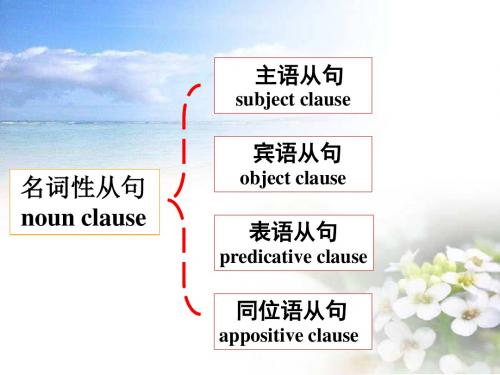
5. “疑问词+ever” whatever, whichever, whoever, whomever 引导宾语从句 I’ll show you whatever you want to see. He likes to makes friends with whoever shares his interest.
二、注意正确使用时态
1. 如果主句是一般现在时、一般将来时或祈使句时,宾 语从句时态不受限制 I hear he is here today/ he was here yesterday/ he will be here tomorrow. 2. 如果主句是一般过去时,宾语从句应与主句保持一致, 即使用过去时态的某种形式。 He said he was watching TV/ he had swept the floor/ he would play football after school. 3. 如果宾语从句所叙述的是客观事实、自然现象、科学 真理等时,从句不受主句限制,用一般现在时。 Everyone answered there are sixty minutes in an hour.
• 2.引导主语从句的词: • 连词:that, whether
起连接作用不充当成分
• 连接代词:what(ever),who(ever), which(ever),whose,
充当主语/宾语/定语等
• 连接副词:when, where, how ,why
充当状语表时间、地点、方式、原因
连接副词:when, where, how ,why引导的主语从句
1.I hear (that)___________.(一小时后会回来)
2.He said (that)___________.(他非常想我们) 3.The teacher told us (that)_____________. (地球围绕太阳转)
高中英语语法-名词性从句精讲(共73张PPT)

Whoever wants the book may have it. I’ll do whatever I can to help him. Buy whichever is cheapest.
连接副词 when, where, how, why
when • When they will start is unknown yet. where • Where she has gone is a mystery. how • How this happened is not clear. why • Why he did that wasn’t quite unclear.
主语从句关联词 连词 that, whether 连接代词 what, who, whom, which 连接副词 when, where, how, why
连词 that, whether
只起连接作用 在从句中不充当任何句子成分
• That he will win is certain.
• It has been reported that sales of beef in China will increase.
宾语从句关联词 连词 that, whether; if 连接代词 what, who, whom, whose, which 连接副词 when, where, how, why
• I doubt _______ he will come soon. • I do not doubt _____ he will come soon. • Do you doubt _____ he will come soon?
• what surprised me was what he said.
高中英语名词性从句精讲
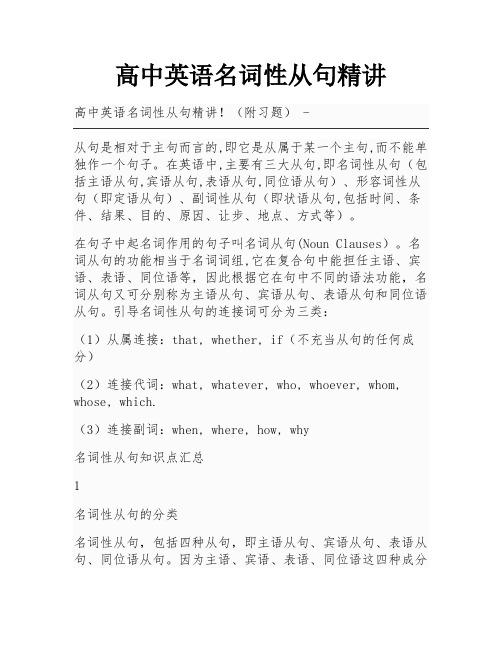
高中英语名词性从句精讲从句是相对于主句而言的,即它是从属于某一个主句,而不能单独作一个句子。
在英语中,主要有三大从句,即名词性从句(包括主语从句,宾语从句,表语从句,同位语从句)、形容词性从句(即定语从句)、副词性从句(即状语从句,包括时间、条件、结果、目的、原因、让步、地点、方式等)。
在句子中起名词作用的句子叫名词从句(Noun Clauses)。
名词从句的功能相当于名词词组,它在复合句中能担任主语、宾语、表语、同位语等,因此根据它在句中不同的语法功能,名词从句又可分别称为主语从句、宾语从句、表语从句和同位语从句。
引导名词性从句的连接词可分为三类:(1)从属连接:that, whether, if(不充当从句的任何成分)(2)连接代词:what, whatever, who, whoever, whom, whose, which.(3)连接副词:when, where, how, why名词性从句知识点汇总1名词性从句的分类名词性从句,包括四种从句,即主语从句、宾语从句、表语从句、同位语从句。
因为主语、宾语、表语、同位语这四种成分均可以由名词构成,所以这四种从句在主句中都充当了名词的作用,故将这四种从句统称为名词性从句。
如:1.That she will help me made us happy.(主语从句)2.I can understand what he said.(宾语从句)3.This is where I was born.(表语从句)4.The fact that a heavy earthquake happened made me crazy.(同位語从句)2名词性从句的连接词分类1.that(无含义,不充当成分)2.whether,if(有“是否”的含义,但不充当成分)3.连接代词:what, whatever, who, whoever, whom, whomever, whose, which, whichever.(在从句中做主语、宾语、表语和定语)连接副词:when, whenever, where, wherever, how, however, why (在从句中做状语)4. as if,as though,because(不充当成分,在名词性从句中只引导表语从句)3连接词 that 在名词性从句中可以省略的三种情况1.it 做形式主语,that引导主语从句时It is said (that) he has been studying abroad.据说他一直在国外学习。
名词性从句学案(语法精讲-主语从句、宾语从句、表语从句、同位语从句)+经典习题(含答案)

名词性从句名词性从句〔主语、表语、宾语、同位语从句〕(一)主语从句1.定义:用作主语的从句叫做主语从句。
2.构成:关联词+简单句3.引导主语从句的关联词有三类:(1) 附属连词that。
如:That they were in truth sisters was clear from the facial resemblance between them.很明显,她们确是亲姐妹,她们的脸型很相似。
(2) 附属连词whether。
如:Whether he’ll come here isn’t clear. 他是否会来这里还不清楚。
(3) 连接代词who, whom, whose, what, which, whoever, whatever, whichever连接副词where, when, how, why。
如:What she did is not yet known. 她干了什么尚不清楚。
解释:1.主语从句能用it作形式上的主语。
常以it作形式主语的句型有:A. It+be+形容词(obvious, true, natural, surprising, good, wonderful, funny, possible, likely, certain, probable, etc.)+that从句。
如:It is certain that she will do well in her exam. 毫无疑问她考试成绩会很好。
B. It+be+名词词组(no wonder, an honour, a good thing, a pity, no surprise, etc.)+that从句。
如:It’s a pity that we can’t go. 很遗憾我们不能去。
C.It+seem, happen等不及物动词及短语+that从句。
如:It seems that Alice is not coming to the party at all. Alice似乎不来参加晚会。
高中英语语法---名词性从句详解
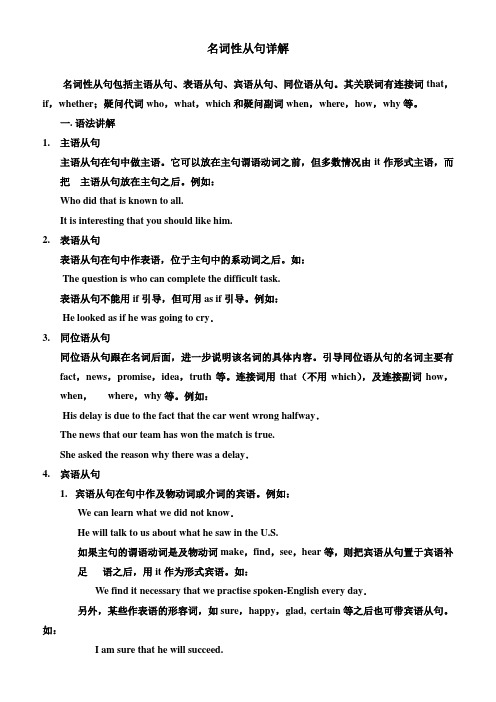
名词性从句详解名词性从句包括主语从句、表语从句、宾语从句、同位语从句。
其关联词有连接词that,if,whether;疑问代词who,what,which和疑问副词when,where,how,why等。
一.语法讲解1.主语从句主语从句在句中做主语。
它可以放在主句谓语动词之前,但多数情况由it作形式主语,而把主语从句放在主句之后。
例如:Who did that is known to all.It is interesting that you should like him.2.表语从句表语从句在句中作表语,位于主句中的系动词之后。
如:The question is who can complete the difficult task.表语从句不能用if引导,但可用as if引导。
例如:He looked as if he was going to cry.3.同位语从句同位语从句跟在名词后面,进一步说明该名词的具体内容。
引导同位语从句的名词主要有fact,news,promise,idea,truth等。
连接词用that(不用which),及连接副词how,when,where,why等。
例如:His delay is due to the fact that the car went wrong halfway.The news that our team has won the match is true.She asked the reason why there was a delay.4.宾语从句1.宾语从句在句中作及物动词或介词的宾语。
例如:We can learn what we did not know.He will talk to us about what he saw in the U.S.如果主句的谓语动词是及物动词make,find,see,hear等,则把宾语从句置于宾语补足语之后,用it作为形式宾语。
英语名词性从句重难点精讲
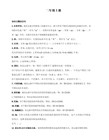
▲注意辨别it作形式主语与it引导的强调句型的差异。如果把句中的it is/ was ... that/ who ...去掉,剩余部分仍能组成一个意义和结构均完整的句子,则原句是强调句型。
It was last summer that he graduated from the college.(→He graduated from the college last summer.) (强调句型)
It is strange that he didn’t come to school.
▲需要注意的是,当 what作“……的东西”讲引导主语从句时,一般不用it作形式主语。whatever, whoever, whichever引导的主语从句一般不用it作形式主语。
(×)It is more experience what he needs. ( 应说:What he needs is more experience.)
▲what指无限定范围的选择。若已限定了范围,则应用which。
That is what he chose.
Which team has won the game is not known yet.
▲what (ever),whoever, whichever 等是双重关系代词,它既起先行词的作用,又起关系代词的作用,此时不可在这些词前加that, all或在这些词后再加关系代词。
(×)All what she said is true. (可说All that she said is true. 或 What she said is true)
(×) Whatever that is worth doing should be done well. (应去掉that)
高考英语名词性从句精析(语法重点、解题步骤、易犯错误)
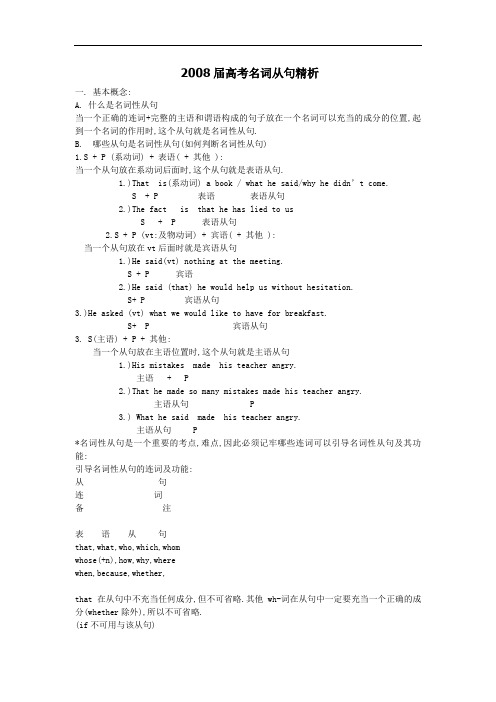
2008届高考名词从句精析一. 基本概念:A. 什么是名词性从句当一个正确的连词+完整的主语和谓语构成的句子放在一个名词可以充当的成分的位置,起到一个名词的作用时,这个从句就是名词性从句.B. 哪些从句是名词性从句(如何判断名词性从句)1.S + P (系动词) + 表语( + 其他 ):当一个从句放在系动词后面时,这个从句就是表语从句.1.)That is(系动词) a book / what he said/why he didn’t come.S + P 表语表语从句2.)The fact is that he has lied to usS + P 表语从句2.S + P (vt:及物动词) + 宾语( + 其他 ):当一个从句放在vt后面时就是宾语从句1.)He said(vt) nothing at the meeting.S + P 宾语2.)He said (that) he would help us without hesitation.S+ P 宾语从句3.)He asked (vt) what we would like to have for breakfast.S+ P 宾语从句3. S(主语) + P + 其他:当一个从句放在主语位置时,这个从句就是主语从句1.)His mistakes made his teacher angry.主语 + P2.)That he made so many mistakes made his teacher angry.主语从句 P3.) What he said made his teacher angry.主语从句 P*名词性从句是一个重要的考点,难点,因此必须记牢哪些连词可以引导名词性从句及其功能:引导名词性从句的连词及功能:从句连词备注表语从句that,what,who,which,whomwhose(+n),how,why,wherewhen,because,whether,that在从句中不充当任何成分,但不可省略.其他wh-词在从句中一定要充当一个正确的成分(whether除外),所以不可省略.(if不可用与该从句)宾语从句that,what,who,which,whom,whose(+n),how,why,where,when,whether,if(是否)That在从句不充当成分,可省. 其他wh-词在从句中一定要充当一个正确的成分(whether,if除外),所以不可省略.主语从句that,what,who,which,whom,whose(+n),how,why,where,when,whether,(if不可用于该从句That在从句不充当成分,但不可省. 其他wh-词在从句中一定要充当一个正确的成分(whether除外)所以不可省略.(if不可用于该从句*特别注意:(1) what,which,who,whose(+n)在从句中可充当主语,宾语或表语(2)whom 在从句中只可做宾语.(3)how,when,where,why在从句中只可做相应的状语(4)使用名词性从句时,从句与主句之间不能用逗号隔开.(5)一些含有内容/信息的名词(fact,news,hope,idea,thought,desire,suggestion,doubt,truth,question,problem, order等)后面可用that或wh-词引导一个同位语从句,对其前面的名词的内容做补充说明: The announcement that a new airport was to be built nearby made us excited.S1 同位语从句 P1We heard the news that the war had broken out between America and Iraq. S1 P1 同位语从句(6)同位语从句与定语从句的区别是:1.) 定语从句前面的名词没有内容或信息含义.2.) 引导定语从句的that在从句中一定要做成分,做宾语时可省略引导同位语从句的that在从句中不做成分,但不可省略.*名词性从句的重要解题步骤:1.)认真读题,分清从句类别2.)根据从句类别,判断适用连词3.)特别注意连词在从句中的作用, 即:连词在从句中充当的成分4.)特别注意哪些连词在哪些从句中不充当成分.5.)特别注意哪些连词在哪些从句中的哪些情况下可以省略.*如何判断名词性从句的类别之图表记忆法:1.主语从句: That / Wh-词 + S1 + P2… + P1 + 其他S1(主语从句)2.表语从句: S1 + P1(系动词be / seem / appear) + that / wh-词 + S2 + P2 + 其表语(从句)3.宾语从句: S1 + P1(vt) + that / wh-词 / whether / if (是否) + S2 + P2 + 其他宾语(从句)另需注意:由动词+介词构成的动词词组后面的从句及一些介词,介词词组后面的从句,也是宾语从句: v+prep + wh-词+ S + P + 其他宾语(从句)prep + wh-词 + S + P + 其他宾语(从句)如:You must pay enough attention to what the teacher has told you.(what在从句中作_____语)The poll will give us information about who is likely to be elected president this time. (who在从句中作_____语)The film is set in what was once called “the Long Beach”(what在从句中作_____语)4.同位语从句: 名词(有内容或信息含义) + that / wh-词 + S + P +其他同位语从句(补充说明前面名词的内容)*名词性从句解题时易犯的错误:错误类型一: that 与what 的混用1. That they are going to discuss at the meeting is how to increase food supply in the world.(错误)What they are going to discuss at the meeting is how to increase food supply in the world. (正确)注:that在引导名词性从句时本身没有意义,也不在从句中充当任何成分;而what则表示“什么”“……的东西或事情”,在从句中充当主语,宾语或表语等。
高考英语名词性从句语法知识点讲解
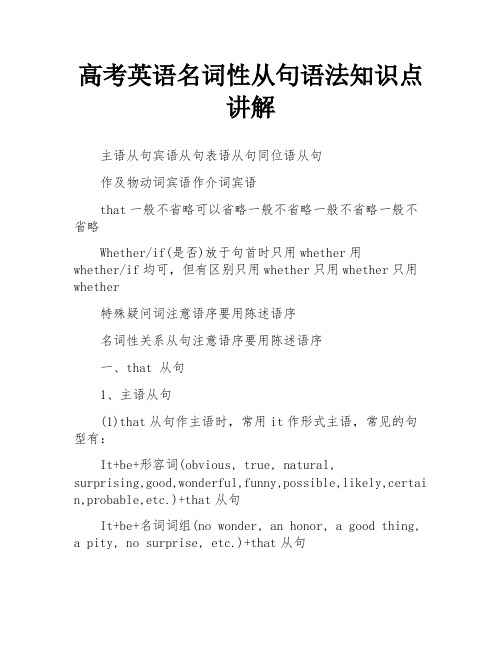
高考英语名词性从句语法知识点讲解主语从句宾语从句表语从句同位语从句作及物动词宾语作介词宾语that一般不省略可以省略一般不省略一般不省略一般不省略Whether/if(是否)放于句首时只用whether用whether/if均可,但有区别只用whether只用whether只用whether特殊疑问词注意语序要用陈述语序名词性关系从句注意语序要用陈述语序一、that 从句1、主语从句(1)that从句作主语时,常用it作形式主语,常见的句型有:It+be+形容词(obvious, true, natural,surprising,good,wonderful,funny,possible,likely,certai n,probable,etc.)+that从句It+be+名词词组(no wonder, an honor, a good thing, a pity, no surprise, etc.)+that从句It+be+过去分词(said, reported, thought, expected, decided, announced, arranged, etc.)+that从句(2)that可以省略,但that从句位于句首时,that不能省略。
2、宾语从句(1)常见的可以接that从句作宾语的动词有see, say, know, imagine, discover, believe, tell, show, think, consider, be sure, be afraid等。
在可以接复合宾语的动词之后,如think, make, consider等,可以用it作形式宾语。
(2)That从句一般不能充当介词宾语,偶尔可作except, in 的宾语。
3、表语从句(that不可省略)4、同位语从句连词that引导同位语从句时,应在某些抽象名词之后,如:fact, hope, desire, thought, suggestion, idea, news, problem, possibility等,对前面的名词起补充说明的作用,that在从句中不担当任何成分,不能省略。
高中英语 简明语法系列名词性从句讲义

名词性从句如果一个句子充当另一个句子的组成部分,如主语、宾语、补语、状语、同位语等,具有这样结构的句子称为主从复合句(Complex Sentence)。
充当某一成分的句子称为从句,带有从句的句子称为主句。
从句对主句的关系是从属关系,之间有一定的连接词加以连接。
名词性从句(Noun Clause)能在主从复合句中作主语、表语、宾语、同位语等。
主语从句如果一个句子充当句子的主语,称为主语从句(Subject Clause)。
1. that引导的主语从句通常以it作先行主语,将that引导的从句置于句末。
这类结构一般有以下几类:(1)It+be+形容词+that从句。
这类形容词常有clear, obvious, likely, true, probable, possible等,也可以把that从句置于句首。
(2)例如:It is obvious that he misunderstood me.That he misunderstood me is obvious.他显然误解了我。
It is true that the college will take in more new students this year.That the college will take in more new students this year is true.今年这所大学将招收更多的新生是真的。
(2) It + be + said/believed/reported/hoped/announced/known…that从句It is believed that Indians were the first settlers in the Americas.一般认为印第安人是美洲大陆最早的居民。
It is well known that the earliest people used sticks and stone tools in hunting animals.众所周知,最早期的人类在捕猎动物时使用棍棒和石制工具。
英语名词性从句(详细讲解)

名词性从句第一部分:语法讲解名词从句是指在句子中起名词作用的各种从句。
根据它们在句子中所起的作用不同,名词从句可以分为主语从句、表语从句、宾语从句和同位语从句。
如:That the earth is round is a fact.I don’t know if he needs my help.I don’t know where he went.2.主语从句1)主语从句在句中作主语。
如:Whether he will accept the invitation is not clear.他是否会接受邀请还不清楚。
When he left is unknown.他什么时候离开还不知道。
That he will come to the discussion is certain.他来参加讨论是肯定无疑的。
2)主语从句放在句首,句子常常显得比较笨重,因此常把它移至句子末尾,而用it作形式上的主语。
如:It is strange that she did not come yesterday. 很奇怪,她昨天没有来。
It has not been announced when the plane is to take off.飞机何时起飞还没有宣布。
It is a pity that Mr.Brown can’t attend our English meeting.真可惜,布朗先生不能出席我们的英语晚会。
3)有些用“it”作形式主语的主语从句结构已形成固定的用法。
a)It is +名词+从句如:It is a fact that…事实是……It is common knowledge that………是常识b)It is +形容词+that从句如:It is necessary that…有必要……It is likely that…有可能……It is important that…重要的是……c)It is +过去分词+从句如:It is said that…据说……It is reported that …据报道……It is well known that…众所周知……It is estimated that…据估计……d)It +不及物动词+从句如:It seems that …好像……It happened that…碰巧……如:It is estimated that millions of galaxies exist in the vast space outside the Milk Way.据估计,在银河系之外的辽阔星空中存在着千百万个星系。
英语语法解析 名词性从句 主语从句

英语语法解析名词性从句主语从句主语从句是名词性从句的一种,名词性从句包括主语从句,宾语从句,表语从句和同位语从句,在复合句(由一个主句和一个或几个从句构成的句子叫复合句)中作主语,宾语,表语和同位语。
主语从句主语从句通常放在主句谓语动词之前,在复合句中作主语,也可以用形式主语it代替,把主语从句放在主句谓语动词后面。
1.主语从句的连接词:从属连词:that,whether连接代词:what,who,which,whatever,whoever,whichever 等连接副词:when,where,why,how2.从属连词that的用法以从属连词that引导的主语从句,that没有意义,只起连接作用,不做成分,不可以省略。
That my form teacher would visit my home surprised my parents. 我的班主任要来我家,这使我父母很惊讶。
That he used to be a dancer is known to all of us. 我们大家都知道他过去是个舞蹈演员。
3.从属连词whether的用法以从属连词whether(是否)引导的主语从句,whether不可以由if代替。
Whether we will play the football match today depends on the weather. 我们今天是否举行足球比赛要看天气而定。
4.连接代词:what,who,which,whatever,whoever,whichever等的用法①连接代词what,who,which,whatever,whoever,whichever等引导主语从句时,连接代词都带有本身的含义:what (所…的),who(谁),which(哪一个;哪一些),whatever(无论什么),whoever(无论谁),whichever(无论哪个;无论哪里)②连接代词在主语从句中要作成分,作主语,宾语或定语。
高考英语语法一轮复习——名词性从句精讲及练习(附答案)

名词性从句在句子中起名词作用的句子叫名词性从句(Noun Clauses)。
名词性从句的功能相当于名词词组, 它在复合句中能担任主语、宾语、表语、同位语、介词宾语等,因此根据它在句中不同的语法功能,名词从句又可分别称为主语从句、宾语从句、表语从句和同位语从句。
一.主语从句主语从句是在主句中作主语的句子,它由连接词引导,通常位于谓语动词之前。
1. 连词:在从句中不充当任何成分,常用见的引导主语从句的连词有三个,即that, whether和if.That he got the first prize excited him much. 他获得一等奖一事使他非常兴奋。
Whether you can succeed or not depends on how hard you work at it. 你能否功取决于你努力的程度。
注意:whether引导的主语从句常用置于句首,表示“是否”之意;if引导主语从句时不置于句首。
2. 连接代词:在从句中起名词或代词的作用,常作从句的主语、宾语、表语或定语,有具体意义且不能省略。
常见的连接代词有who, whom, whose, what, which, whoever, whomever, whatever, whichever.What we should do with the problem is undecided. 我们如何处理这上问题还未作出决定。
3. 连接副词:在从句中起副的作用,常作从句的状语,表示时间、地点、原因、方式等。
常见的连接副词有when, where, how, why, whenever, wherever, however等。
How they will solve the serious problem has not been decided. 他们将如何解决这个严重的问题还没有决定。
Why he did that wasn’t quite clear. 他为什么做那件事还不十分清楚。
语法专项·精讲—名词性从句

︱高中总复习︱一轮·英语
考点三 what,wh-ever引导的名词性从句 1.what引导名词性从句时,what在从句中作主语、宾语、表语、定语。
“Every time you eat a sweet, drink green tea.” This is what my mother used to tell me.
︱高中总复习︱一轮·英语
名词性从句
语法专项·精讲 跟踪训练·运用
︱高中总复习︱一轮·英语
语法专项·精讲
细筛选·巧拓展
考点一 名词性从句的种类
1.主语从句
it作形式主语,常见的句型有:
(1)It+be+形容词(obvious,true, natural, surprising, important, good,
︱高中总复习︱一轮·英语
8.Your support is important to our work.You can do 9.The most pleasant thing of the rainy season is
entirely free from dust.
helps. one can be
2.表语从句 (1)because引导的表语从句强调原因,而why引导的表语从句强调结果。 If I’m a bit sleepy,it’s because I was up all night. 如果我有点困,是因为一夜没睡。 That’s why I object to the plan. 这就是我反对这个计划的原因。
︱高中总复习︱一轮·英语
4.However, there are a number of other reasons that might explain
- 1、下载文档前请自行甄别文档内容的完整性,平台不提供额外的编辑、内容补充、找答案等附加服务。
- 2、"仅部分预览"的文档,不可在线预览部分如存在完整性等问题,可反馈申请退款(可完整预览的文档不适用该条件!)。
- 3、如文档侵犯您的权益,请联系客服反馈,我们会尽快为您处理(人工客服工作时间:9:00-18:30)。
英语语法名词性从句精讲在复合句中起名词作用的从句叫名词性从句,包括作主语从句、表语从句、宾语从句和同位语从句。
(1)主语从句就是在复合句中作主语的从句。
主语从句常用that, whether, who, whom, whose, what, which, when, where, how, why, whatever, whoever等引导。
如:Whether he will be able to come remains a question. 他是否来还是问题。
That China is a great socialist country is well known. 众所周知,中国是一个伟大的社会主义国家。
注:为避免头重脚轻,使句子平衡,常用it作形式主语,而将主语从句后置。
如上述第二例常说成:It is well known that China is a great socialist country.但是,由连接代词what, whatever, whoever等引导的主语从句一般不能用形式主语。
如:What he found surprised me greatly. 他的发现使我非常吃惊。
Whoever is finished may rest. 凡是做完工的人都可以休息。
(2)表语从句就是在连系动词之后作表语的从句。
引导表语从句的连接除与引导主语从句的连接词外,还有as if,as though。
如:The question is whether he is able to do it alone. 问题是他能否单独做这件事。
It looks as if (though) it is going to snow. 天好像要下雪似的。
注意:要区分以下句式:1. that’s why+结果;that’s because+原因。
2. the reason why /for…is that…He is absent. That’s because he is ill. 他缺席,这是因为他生病了。
He is ill. That’s why he is absent. 他病了,这就是他缺席的原因。
The reason why he is absent is that he is ill. 他缺席的原因是他生病了。
(3)宾语从句就是在复合句中作宾语的从句。
引导这宾语从句的连接词与引导主语从句的连接词基本相同。
如:They didn’t say which they wanted. 他们没有说他们想要哪一个。
I am sure (that) no harm will ever come to you. 我肯定你永远不会受伤害。
I was surprised at what has happened.我对发生的事感到惊讶。
注意:当think, believe, suppose等的疑问式后面跟连接代词或连接副词引导的宾语从句时,习惯上将这些连接词置于句首,即“连接代/副词+do you think /believe /expect+宾语从句的其余部分?”如:Who do you think is the best player this year? 你认为今年谁是最佳运动员?What do you suppose you will do after school? 你想放学后干什么?(4)同位语从句就是在句中作同位语的从句。
它通常有放在thought, idea, news, word(=news), plan, doubt, question, fact, suggestion, belief等抽象名词的后面,说明这些词的具体内容或含义。
同位语从句大多由that引导,也可由whether, how, when, where, why等引导,但不能由which引导。
如:The idea that the earth is round is not a new one. “地球是圆的”这种观点并不新鲜。
He must answer the question whether he agrees to it or not. 他必须回答他是否同意此事这们一问题。
I have no idea when he will set out. 我不知他什么时候出发。
注:有时,同位语从句并不紧跟在它所说明的词的后面。
如:The whole truth came out at last that he was a wolf in sheep’s clothing. 真相终于大白了,他原来是一只披羊皮的狼。
注意1 语序问题不管什么词引导,从句的语序始终用陈述语序。
如:(1)He asked how he could find his courage. 他问道他如何才能找到他的勇气。
(2)The question is why there is little rain here. 问题是这里为什么雨水少。
注意2 连接词的选用问题A.that,whether,if,as if(限用于表语从句)都不作句子的任何成分。
因此,它们所引导的句子结构必须完整。
that 一般用于确定的语气中,引导宾语从句时,口语中的that可省略,而其他情况中的that一般不可省;而whether,if一般用于不确定的语句中。
如:(1)That he learnt English before is certain. 他学过英语是肯定的。
(2)I don’t know whether / if he will come. 我不知道他是否会来。
(3)He looks as if he knows the answer. 看起来他好像知道答案。
B.whether和if1)whether可用于任何名词性从句中,而一般只能用于宾语从句中。
如果if引导主语从句时,只能放在句中,而不能置于句首。
如:(1)Whether he will come or not doesn’t matter. —It doesn’t matter whether he will come or not. 他来还是不来都没关系。
(2)Do you know if / whether his words are true. 你知道他的话是否真实吗?2)whether可与or not连用,而if则不可以。
如(1)I’m not sure whether / if he can overcome the difficulties. 我没有把握他能否克服这些困难。
(2)The radio didn’t say whether it would rain or not tomorrow. 收音机并没有报道明天是否下雨。
3)若用if会产生歧义时,则用whether。
(1)Let me know whether he will come. 告诉我他是否会来。
(2)Let me know if he will come. 可理解为:告诉我他是否会来。
也可理解为:如果他愿意来,就告诉我一声。
4)whether可与不定式连用,而if不可以。
Have you decided whether to go there tomorrow? 明天是否去那儿,你决定了吗?(句子中的whether不能用if替换)5)whether引导的从句可作某些介词及动词discuss的宾语,而if则不可以。
如:(1)They are talking about whether they will take part in the strike. 他们在谈论他们是否要参加这次罢工。
(2)They are discussing whether they can employ the new way. 他们在讨论他们是否可以采用这种新的方法。
(以上两个句子中的whether 不能用if替换)6)宾语从句若为否定句,连接词则用if 而不用whether。
如:Do you know if he hasn’t been to Washington? 你知道他是否没有去过华盛顿吗?此句子中的If不能用whether替换。
一、词序问题名词性从句总是用陈述句词序,则不能使用疑问句词序,尤其是当名词性从句由“疑问词”引导时,不能受疑问句的影响而误用疑问句词序:误:I didn’t know where did he live.正:I didn’t know where he lived. 我不知道他住哪儿。
误:Who will he marry remains unknown.正:Who he will marry remains unknown. 他同谁结婚还不知道。
二、时态问题由于由when引导的时间状语从句和以if引导的条件状语从句要用现在时表示将来意义,而不能直接使用将来时态,所以许多同学容易受此影响在when和if引导名词性从句时也用现在时表示将来意义。
请看几题:(1) I don’t know if he ________ or not tomorrow.A. comeB. comesC. will comeD. is coming此题答案选C,句中if引导的不是条件状语从句(if≠如果),而是宾语从句(if=是否),句意为“我不知道明天他是否会来。
”(2) I don’t know if she ________, but if she ________ I will let you know.A. comes, comesB. will come, will comeC. comes, will comeD. will come, comes答案选D,第一个if 引导的是宾语从句,第二个if 引导的是条件状语从句。
(3) “When he _____ is not known yet.”“But when he ____, he will be warmly welcomed.”A. comes, comesB. will come, will comeC. comes, will comeD. will come, comes答案选D,第一个when 引导的是主语从句,第二个when引导的是时间状语从句。
另外,当主句为过去时态时,宾语从句通常要用过去的某种时态与之呼应(表客观真理时除外):The teacher told us that he knew everything. 老师告诉我们他知道一切。
The teacher told us that light travels faster than sound. 老师告诉我们光比声音传播得快。
